The Day of the Beast
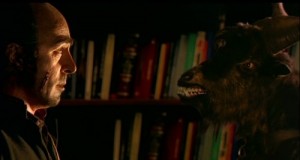 If filmmaking is an act of myth-making, than what is a filmmaker who spends his time busting up long held myths? He’s not Penn and Teller, who specialize in creating magic and then explaining to you what a dope you are for falling for it. He’s not a meta-filmmaker who likes to break the fourth wall and continuously remind you that you’re watching a movie. He’s not a Cinema Verite filmmaker who will do his best to reflect reality and show you the truth, often in a rather painful way. He’s too much of a liar to engage in Cinema Verite, but he likes to play with absurdity while relishing gritty realism in a different way. He’s… not a lot of things, but he very well could be Álex de la Iglesia.
If filmmaking is an act of myth-making, than what is a filmmaker who spends his time busting up long held myths? He’s not Penn and Teller, who specialize in creating magic and then explaining to you what a dope you are for falling for it. He’s not a meta-filmmaker who likes to break the fourth wall and continuously remind you that you’re watching a movie. He’s not a Cinema Verite filmmaker who will do his best to reflect reality and show you the truth, often in a rather painful way. He’s too much of a liar to engage in Cinema Verite, but he likes to play with absurdity while relishing gritty realism in a different way. He’s… not a lot of things, but he very well could be Álex de la Iglesia.
Álex de la Iglesia’s films all tend to follow the same pattern, where we peek behind the curtain whether it be about ostracized mutants (Acción Mutante), TV comedy teams (Dying of Laughter), Cowboy heroes (800 Bullets), or satanic rituals (Perdita Durango, The Day of the Beast) and we’re unlikely to enjoy what we find. Not that having our expectations dashed is a problem, but the characters in de la Iglesia’s films are perpetually overcompensating, they’ve lived their lives by a certain code and never really thought about whether that code made any sense.
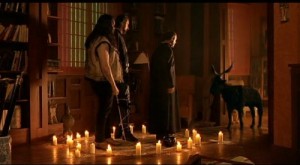 In The Day of the Beast, the overcompensation list is long; There’s the priest (Álex Angulo) who thinks he has to engage in petty crime to summon the devil, the death metal enthusiast (Santiago Segura) who feeds his invalid grandfather LSD and runs a record store and throws shoplifters headfirst through glass, his racist mother (Terele Pávez) who wants the scum of the street to stay at her hostel so she can blow them away with a shotgun, and there’s the TV psychic (Armando De Razza ) who engages in exorcisms and writes phony occult books for the masses.
In The Day of the Beast, the overcompensation list is long; There’s the priest (Álex Angulo) who thinks he has to engage in petty crime to summon the devil, the death metal enthusiast (Santiago Segura) who feeds his invalid grandfather LSD and runs a record store and throws shoplifters headfirst through glass, his racist mother (Terele Pávez) who wants the scum of the street to stay at her hostel so she can blow them away with a shotgun, and there’s the TV psychic (Armando De Razza ) who engages in exorcisms and writes phony occult books for the masses.
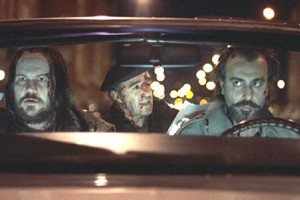 The priest is a literalist through and through, so free from cynicism that he never considers that his quest to stop the Anti-Christ from being born might be met with some skepticism. When he chases a woman whose blood he [mistakenly] believes he needs for an incantation, she falls down the stairs. His response to her boyfriend, the TV psychic, is “it should have been deliberate, but it was an accident.” This sort of macabre comedy is what de la Iglesia excels at, the slapstick sequences where the priest steals luggage, robs homeless beggars of their change, are endlessly funny, and he manages to maintain this tone, where we’re completely in the dark about his motivations for nearly 20 minutes. When we do get the exposition, de la Iglesia cleverly has the priest, who is also a religion teacher, explain it in detail on a blackboard, so it doesn’t seem as awkward as it could have been considering the complications inherent in the story.
The priest is a literalist through and through, so free from cynicism that he never considers that his quest to stop the Anti-Christ from being born might be met with some skepticism. When he chases a woman whose blood he [mistakenly] believes he needs for an incantation, she falls down the stairs. His response to her boyfriend, the TV psychic, is “it should have been deliberate, but it was an accident.” This sort of macabre comedy is what de la Iglesia excels at, the slapstick sequences where the priest steals luggage, robs homeless beggars of their change, are endlessly funny, and he manages to maintain this tone, where we’re completely in the dark about his motivations for nearly 20 minutes. When we do get the exposition, de la Iglesia cleverly has the priest, who is also a religion teacher, explain it in detail on a blackboard, so it doesn’t seem as awkward as it could have been considering the complications inherent in the story.
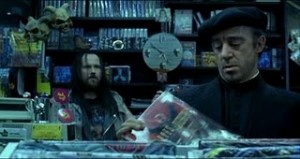 This is where the myth busting comes into play, and like any protagonist in a de la Iglesia film (Iglesia means Church in Spanish, a witty coincidence), the priest is forced to abandon what he believes and make up the rules as he goes along. The film is aware that the plot points are absurd, and de la Iglesia visually tells the story as if it were a mean spirited comic book, but it all plays straight, with no irritating winking. The obvious joke to be told in a story like this is that the world has already gone to hell, and the public’s apathy is so dominant that they wouldn’t even notice the apocalypse. De la Iglesia acknowledges this notion, but doesn’t harp on it too much, which helps when the comedy shifts and escalates into crunching and cringeworthy violence.
This is where the myth busting comes into play, and like any protagonist in a de la Iglesia film (Iglesia means Church in Spanish, a witty coincidence), the priest is forced to abandon what he believes and make up the rules as he goes along. The film is aware that the plot points are absurd, and de la Iglesia visually tells the story as if it were a mean spirited comic book, but it all plays straight, with no irritating winking. The obvious joke to be told in a story like this is that the world has already gone to hell, and the public’s apathy is so dominant that they wouldn’t even notice the apocalypse. De la Iglesia acknowledges this notion, but doesn’t harp on it too much, which helps when the comedy shifts and escalates into crunching and cringeworthy violence.
The shift is very reminiscent of Sam Raimi’s work, especially the Evil Dead series. There’s even a nod to Raimi’s Darkman (and the elevator in Angel Heart) at the conclusion of The Day of the Beast, both of which end with the main characters overwhelmed while atop a scaffolding of a skyscraper. There’s the middling blue screen work that plagued the final scenes of Darkman as well, as someone is about to be dropped off the building.
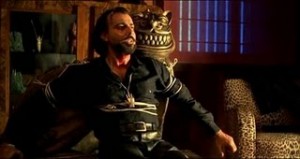 But de la Iglesia’s style isn’t all homage, and like the Spanish language genre filmmakers that spawned along with him during the early 1990s (Alejandro Amenabar, Guillermo Del Toro, Robert Rodriguez), his goal isn’t rip-off but rather playing off the notion that he’s bumping against the limits of his financial backing. The smallness becomes charming. It would be easy for The Day of the Beast to be a bunch of references to other religious-themed films (The Exorcist, The Omen), but like a latter day Larry Cohen (Q: The Winged Serpent, The Stuff, God Told Me To), de la Iglesia pushes forward, despite the fact that he doesn’t have the money to match his ambitions, and there’s no way for the story to wrap up itself in any neat and logical way. It’s a rare feat that a movie can be as satisfying as The Day of the Beast *because* of its rather glaring limitations.
But de la Iglesia’s style isn’t all homage, and like the Spanish language genre filmmakers that spawned along with him during the early 1990s (Alejandro Amenabar, Guillermo Del Toro, Robert Rodriguez), his goal isn’t rip-off but rather playing off the notion that he’s bumping against the limits of his financial backing. The smallness becomes charming. It would be easy for The Day of the Beast to be a bunch of references to other religious-themed films (The Exorcist, The Omen), but like a latter day Larry Cohen (Q: The Winged Serpent, The Stuff, God Told Me To), de la Iglesia pushes forward, despite the fact that he doesn’t have the money to match his ambitions, and there’s no way for the story to wrap up itself in any neat and logical way. It’s a rare feat that a movie can be as satisfying as The Day of the Beast *because* of its rather glaring limitations.



